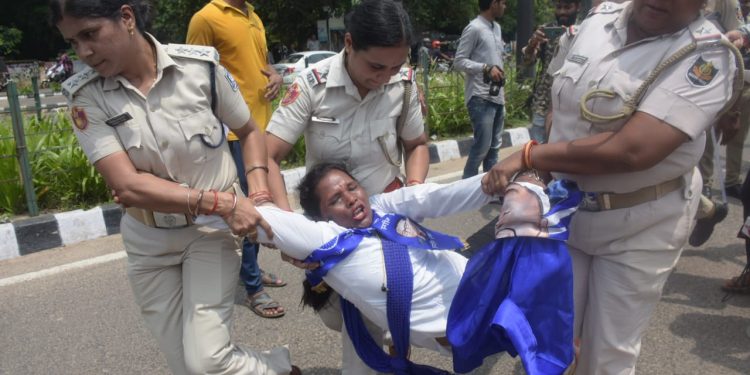New Delhi/Patna: The daylong nationwide strike called by some Dalit and Adivasi groups against the Supreme Court’s verdict on the sub-classification of Scheduled Castes affected normal life in Bihar and Jharkhand as well as tribal areas of various states.
The response was tepid in other parts of the country even as several INDIA bloc parties as well as other non-BJP outfits extended their support to the bandh.
The Chhattisgarh unit of the Congress said the government should consider the “legitimate demands” of the protesters sympathetically. However, the BJP’s prominent tribal leader Faggan Singh Kulaste accused the opposition of politicising the Supreme Court’s ruling on the issue.
Twenty-one organisations across the country had called for the Bharat Bandh against the apex court’s order, which they said would harm the basic principles of reservation.
The protesters put up rail and road blockades in several districts of Bihar, and police used batons and water cannons to disperse them. Darbhanga and Buxar witnessed disruption in train services while traffic was blocked in Patna, Hajipur, Darbhanga, Jehanabad, and Begusarai districts.
The RJD and other partners of the INDIA bloc extended their support to the bandh. Independent MP Rajesh Ranjan alias Pappu Yadav, led demonstrations in Patna and other areas, criticising the NDA government’s stance on SC/ST quota and alleging that it wants to undermine reservations.
In Patna, police chased away crowds who blocked traffic at Dak Bungalow Chowk. Five people were detained in Jehanabad district following clashes between protesters and security personnel.
In other districts, including Madhepura, Muzaffarpur, Saran, Begusarai, Hajipur, and Purnea, protesters attempted to block traffic and burned tyres, but were dispersed by security forces.
East Central Railway Chief Public Relations Officer Sharswati Chandra confirmed that train services were disrupted in Ara, Chausa (Buxar), Darbhanga, Begusarai, and Rajgir, but the situation was promptly controlled.
Public buses stayed off the roads and schools remained closed in Jharkhand where the call for the bandh was backed by the state’s ruling alliance. The Left parties too have extended their support to the strike.
Chief Minister Hemant Soren has cancelled his visit to Palamu on Wednesday due to the strike, an official said, adding security was bolstered at key locations to prevent any untoward incident.
The practical examination of Bachelor of Education (B.Ed) students at Ranchi University was postponed owing to the strike.
Attendance was thin in offices as several long-route public buses did not ply. Protesters burnt tyres and put up blockades at various places in Ranchi. The bandh supporters urged shopkeepers to down the shutters in the Jharkhand capital. Road blockades were erected in Palamu, Godda, Dumka, Garhwa and other districts.
“We are not protesting the top court’s verdict. We hit the streets to protect our rights provided by the Constitution,” said Adivasi Jan Parishad president Prem Sahi Munda.
Rail and road communications were partially affected in Odisha but government offices, banks, business establishments and educational institutions functioned normally.
The agitators briefly stopped trains at Bhubaneswar and Sambalpur while passenger buses did not operate on some routes.
The call for the strike evoked a mixed response in Chhattisgarh, barring its tribal-dominated areas. Transport services largely remained unaffected in the rest of the state.
In parts of Bastar and Surguja divisions, and Mohla-Manpur-Ambagarh Chowki and Dhamtari districts several shops and commercial establishments remained closed. Bastar Division comprises seven districts and Surguja Division six districts.
At Dantewada district’s headquarters, a huge motorcycle rally was organised by members of Sarva Adivasi Samaj (SAS), an umbrella body of tribal organisations.
The opposition Congress extended its “moral” support to the shutdown and called for addressing concerns of members of ST and SC communities.
“People belonging to ST and SC communities and their organisations called for Bharat Bandh for their legitimate demands, which should be considered sympathetically as it is their Constitutional right. Congress morally supports their agitation,” said the state Congress’ communication wing head Sushil Anand Shukla.
Kulaste the BJP MP from Madhya Pradesh’s Mandla (ST) seat said, “The judges have given their opinion. I personally along with 60-70 MPs met Prime Minister Narendra Modi on this issue. The PM told us that the creamy layer provision will not be implemented among SCs and STs.”
“Despite such clarity and decision of the government, people have called for a Bharat Bandh… They are playing politics. The Congress played politics in the name of SCs and STs and Mayawati is also doing the same,” Kulaste said.
The call for the nationwide strike had some impact in Gujarat’s tribal belts as well, including in Chhota Udepur, Narmada, Surendranagra, Sabarkantha and Aravalli districts where markets in cities and semi-urban areas remained closed.
Protesters briefly blocked a goods train in Wadhwan taluka of Surendranagar district and shouted slogans. At Bhiloda and Shamlaji in Aravalli district, roads were blocked by protesters. Several people were detained in Patan and Aravalli districts while trying to enforce the bandh, officials said.
Umarpada town in the Surat district wore a deserted look in the afternoon as shops remained closed.
The call for strike had little impact on normal life in Uttar Pradesh as shops were open and it was business as usual in large parts of the state amid tight security arrangements.
The opposition BSP and SP extended their support to the bandh. BSP workers held a demonstration near Hazratganj, briefly affecting the traffic flow.
The Bhim Army held protests in pockets of western Uttar Pradesh where it has a sizeable presence. “Today’s mass movement is a clear message to central and state governments that now the Bahujan Samaj will not allow the conspiracy of divide and rule to succeed,” Azad Samaj Party (Kanshiram) president and Lok Sabha MP from Nagina Chandra Shekhar Aazad said in a post on X.
Other northern states, including Rajasthan, Punjab and Haryana, remained largely unaffected, barring a few places where markets remained closed and public transport services were partially affected.
Rajasthan police chief U R Sahoo said, “Barring two to three minor incidents at different places, the bandh was peaceful across the state.” Rallies and protest marches were taken out in all districts.
In Jaipur, the SC/ST Sanyukt Sangharsh Samiti held a rally against the August 1 Supreme Court. “During the rally, the markets remained closed and opened after 3 pm. The bandh was peaceful,” Suresh Saini, general secretary of Jaipur Vyapar Mahasangh, said.
Shops and other commercial establishments functioned normally in Punjab and Haryana as police in both states made elaborate security arrangements to maintain law and order.
In Phagwara, some educational institutions were closed by their management as a precautionary measure. Protest marches were taken out in Phagwara, Jalandhar and Hoshiarpur districts. Schools functioned normally in Ludhiana.
The bandh had no impact in Assam where schools, offices and business establishments functioned normally with almost full attendance across the state.
The August 1 Supreme Court order held that states are constitutionally empowered to make sub-classifications within SCs, which form a socially heterogeneous class, for granting reservation for the uplift of castes that are socially and educationally more backward among them.
PTI






































